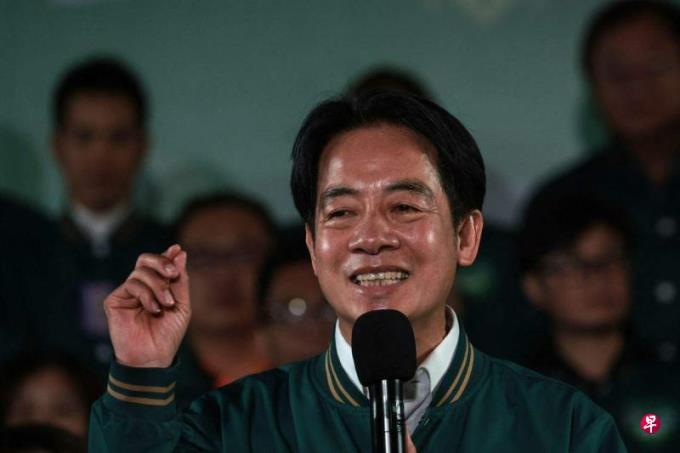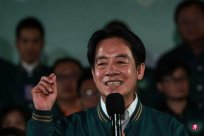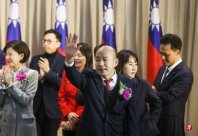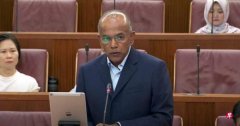
Beijing laughed at Taiwan's free elections or slandered its leaders, especially Beijing's own political reforms have stalled and even retreated.As more and more people sympathize with Taiwan and welcome Taiwan's positive contributions to the world, Beijing's issues on Taiwan are purely Chinese internal affairs, and will face more and more viewing and challenges in Taiwan and other places.What is really worrying is the result of the American election in November this year.
Taiwan's presidential and legislators elections on January 13 have attracted global attention due to the significant influence of cross -strait relations and US -China relations.Now the dust is settled, the following is some revelation.
First of all, the Taiwan elections in 2024 are very special, and all participating political parties can claim to have achieved some victory.Lai Qingde, the Democratic Progressive Party and candidate, is undoubtedly the biggest winner, because he defeated competitors from the Kuomintang and the Taiwanese Party;This is the first time in Taiwan since the President's direct election in 1996.However, Lai Qingde only received 40%of the votes, which means that 60%of voters did not choose him.In addition, the Democratic Progressive Party also lost major seats in the Legislative Yuan.This is definitely not the overwhelming victory of the DPP or Lai Qingde.
Both the Kuomintang and the people can be said to be a small victory. The former has become the largest party of the Legislative Yuan.The party will be attracted by the two big parties so that the majority of the legislature can be formed.
Even Washington and Beijing can be regarded as winners.It is believed that the United States tends to support a political party that can fight against both mainland China without being too tough to prevent the Taiwan Strait crisis.Washington regards the leaders of the DPP as a model for handling cross -strait relations and strengthening US -Taiwan relations.However, Washington had doubts about Lai Qingde, and he was worried that he would "pragmatic Taiwan independence workers" and might drag the United States into a direct conflict with China.Nevertheless, for the United States, the Democratic Progressive Party and Lai Qingde are still desirable, because the Kuomintang is generally considered to be pro -China, and the Civil Party's Ke Wenzhe is a bit elusive.
60%of Taiwanese voters want to remove the DPP may make Beijing feel a little comfort.The Kuomintang and the People's Party failed to campaigrate, giving Lai Qingde a chance to win.Beijing insists that Lai Qingde does not represent the mainstream public opinion of Taiwan, which makes some sense.Beijing is definitely not satisfied with the results of the election, but it may not be surprised.
The DPP may be in power for a long time
Secondly, due to the election system and highly divided Taiwanese society, the DPP is likely to continue to be in power for a long time in the future.Candidates for the DPP only need to win the support of the basic disk (about 40%of the qualified voters) to easily defeat the challenger.
On the other hand, the current maximum support rate of the Kuomintang is less than 35%.The support rate of other political parties will be lower.Therefore, Taiwan's politics may have entered such a period: even if the DPP's performance is lacking, up to 60%of voters do not support it, but it can continue to govern.
The polls before the election clearly show that Lai Qingde will win.Nevertheless, some people within the Beijing and Kuomintang still have hope for the Kuomintang this time, because the Kuomintang is more united than ever, and all factions are united around the party and candidate Hou Youyi.After Ma Ying -jeou's presidential term (2008 to 2016), the Kuomintang never won the throne of the president so close.In the end, Hou Youyi only received 33.49%of the votes.The election in 2024 shattered the hope of the Kuomintang's re -governing in the near future.
However, even if the Kuomintang or the People's Party win the presidential election, Beijing will not be satisfied, because the two parties only support the maintenance of the two sides of the strait, not unified with mainland China.All three political parties have supported establishing a solid relationship with the United States and strengthening Taiwan's military preparation.The "one country, two systems" proposed in Beijing is not attractive to these political parties.No matter who governs in Taipei, it is unlikely to cooperate with Beijing to promote unification.
Third, Beijing is now facing a dilemma: on the one hand, it must make a response to send some warnings to the upcoming Lai government; on the other hand, if it reacts over, its relationship with Washington will be affected, and its relationship with Washington will be affected.Cross -strait relations will worsen further.This explains why it has so far, its response is quite mild.Just like ducks paddling, it seems calm on the water, but it is desperate under the water. Beijing may be anxiously exploring appropriate action.
Beijing has listed Lai Qingde as a division, so it is unlikely to talk to him.However, rejection of him cannot solve the problem.Beijing will definitely make concessions in the principle of "one China" in order to talk to Lai Qingde, who believes that cross -strait do not belong to each other.However, if it is not directly communicated, the gap between the two sides will continue to expand, and Taiwan will gradually follow China.However, if Beijing decides to punish Lai Qingde, it may eventually hurt 60%of voters who vote against him and create more anti -Chinese emotions among the Taiwanese people.Beijing is therefore caught in a situation of "not doing, not doing it".
Highlight the differences between the two sides of the strait
Cross -strait relations have entered an uncertainty.It is difficult for us to predict what actions will Beijing take the next step, but it is clear that Lai Qingde's election will bring severe challenges to the Chinese government.Even before the election, Beijing had hinted that it might terminate trade and tariff policies under the Straits Cross -Strait Economic Cooperation Architecture Agreement (ECFA) reached during Ma Ying -jeou's administration.Two days after the election, the South Pacific National Nauru broke her diplomatic relations with Taiwan and changed diplomatic relations with mainland China.Beijing may take measures to combine economic, military and diplomacy in Taiwan according to its own calculations.
Fourth, although Beijing claims that Taiwan's elections are local elections in mainland China, most external observers are impressed by Taiwan's stable election process and peaceful power transfer.On the occasion of other democratic countries including the United States, Taiwan is becoming a tough democratic country.Democracy has become Taiwan's belief and citizen culture.The more such an election is held in Taiwan, the more the international community can see the differences between the two sides of the Strait.
Beijing laughed at Taiwan's free elections or slandered its leaders, especially Beijing's own political reforms have stalled or even retreated.Mainland China still regards Taiwan's issue as an extension of the Chinese civil war that has not been ended in the 1940s, but the DPP government has strived to internationalize Taiwan's issue, highlighting its democratic freedom and the key role in the global economy.As more and more people sympathize with Taiwan and welcome Taiwan's positive contributions to the world, Beijing's issues on Taiwan are purely Chinese internal affairs, and will face more and more viewing and challenges in Taiwan and other places.
The United States and China Cooperation is important
Finally, cooperation in the United States and China is still the key to peace, stability and prosperity in the Taiwan Strait.Beijing and Washington have recently been working together to improve bilateral relations and respond to the challenges of Taiwan issues.US officials reiterated that Washington's long -term "one China" policy opposes the unilateral change of the status quo, and President Biden immediately said that he did not support Taiwan independence after the election in Taiwan, which would help stabilize the situation in the Taiwan Strait.Washington does not want to see any unexpected actions in Beijing or Taipei.As long as Washington continues to deter Beijing and controls Taipei, this delicate status quo can be maintained.
What is really worrying is the result of the US election in November this year.Biden's re -election will ensure that the Taiwan Strait is relatively stable.Trump's return to the White House may bring new uncertainty to the triangle relations in Washington, Beijing, and Taipei.Judging from Trump's first term, he may not care about Taiwan's issue, but he may be surrounded by anti -Chinese fanatic elements. They may encourage Taipei to cross the red line of Beijing, such as modifying Taiwan's official name or Chinese ChinaConstitution of the Republic of China.If this happens, a gameThe crisis will sweep the sea and the sea, which is likely to cause China and the United States to fall into a direct military conflict.
The author is a professor of politics and international relations at the University
The English Electronics Magazine "ThinkChina" (ThinkChina "
Golden Shun Translation
https://www.thinkchina.sg/beijings-dilemma-what-do-president-william- lai?utm_source=zbsg-weight




